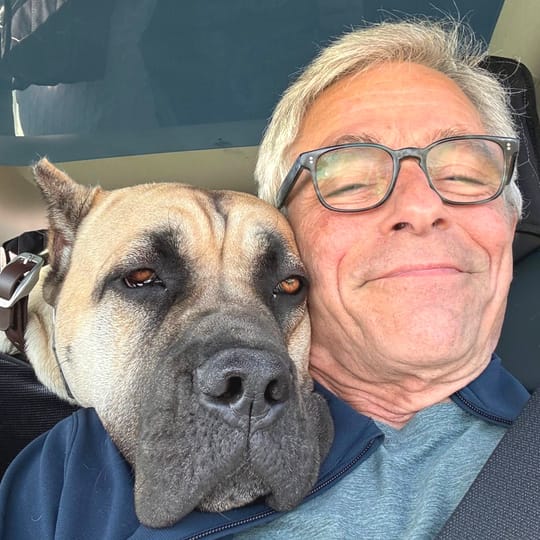
Now This Is Interesting
Many of you know from my posts that I have a dog named Juno.
Juno is a Cane Corso (Italian Mastiff). She weighs 120 lb, drools like crazy at the sight or smell of food (my pants and shirts get covered in slobber every day), and is a total sweetheart.
Notice the genuine connection between us that is so obvious in the picture. We love each other (of course, I am taking a little anthropomorphizing liberty here, but so what).
Though she is a total sweetheart, she is a big and serious dog that needs structure and training or she will dominate our lives, so I made a commitment to learn how to train and handle dogs and the resource I've used is Leerburg, an incredible resource for dog training - from basic obedience all the way to tracking and protection.
Leerburg is run by Ed Frawley, who has bred and trained dogs for police departments and the military. In addition to his courses, he has courses by other world-class trainers like Michael Ellis.
I was watching a course by Michael Ellis (who has been doing this for over 40 years) and he recounted the old days of dog training when "crank and yank" was the way trainers trained dogs.
"Crank and yank" refers to punishing a dog until it "gets it." Michael told the story of when he used to breed and train dogs for the San Diego police department in the old days, when crank and yank was the method of the day.
For example, to get the dog to sit, you slap on a prong collar or electronic collar and pull up on the prong collar hard or deliver a shock until the dog sits. The training was solely based on fear and punishment.
So years ago, Michael trained the canine police officers how to do crank and yank to teach the dogs. The result? 100% of the canine police officers got bitten by the dogs. Picture it - Belgian Malinois or German Shepherd dogs biting you.
Not good.
As time went on, reward-based training (food, affection, or play) came into being, and when he introduced this method before adding corrections, the rate at which the canine police officers were bitten dropped by over 90%
The bite rate went from 100% to under 10%!
You may be saying Duh, so what else is new?
The key here is that the canine police officers, using reward-based training, first created a relationship. Once trust and bonding were established, the need for corrections and their intensity dropped dramatically.
This is a notion that crops up over and over in life, in my work coaching, and in our surgical world. We think we should just be able to tell people what to do or hammer them without doing the work of creating a relationship first, be it the resident, the scrub nurse in the OR, or even our loved ones.
It's ass-backward, just like it was with dog training.
In any leadership realm, be it in title, or in Every Day Leadership, the relationship comes first.
It works so well because instead of getting people (or dogs) to do something out of fear or pressure, they instead will want to do something because they care, about you, because you took the time to see them, to understand them, and to value them.
When people care, the need for accountability goes way down, just like the need for corrections goes down with dog training. Plus, when you do have conflict, and it always comes, there is a firm foundation that will allow you to have productive conflict, instead of destructive conflict.
Have a great weekend!
Feedback with a thumbs up or down is greatly appreciated, or drop an email to me michael@michaelmaddaus.com.
